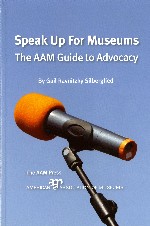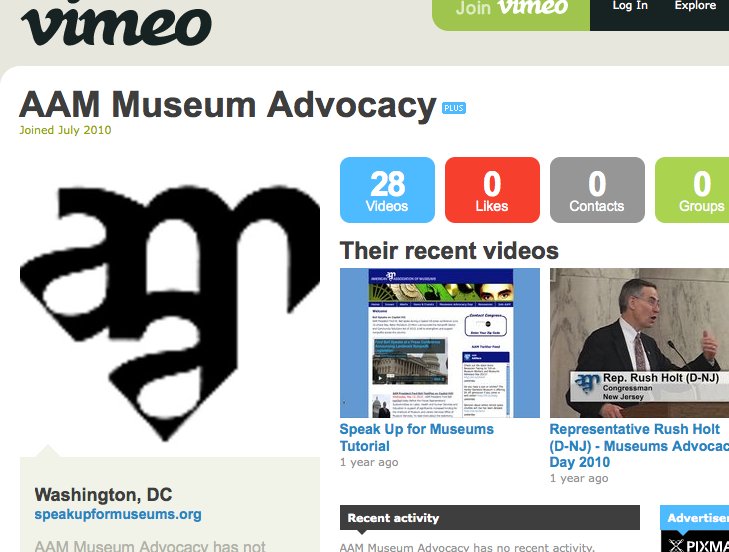By: Julie K. Stein, President WMA
WMA is a 2012 Co-Convenor of
Museums Advocacy Day and so entitles all WMA members to participate for FREE in this two-day event (February 27-28, 2012) in Washington, DC. Email wma.membership(at)gmail.com to check your membership status, and to get the code for free registration to Museums Advocacy Day 2012!
Since the American Association of Museums (AAM) has appointed Gail Ravnitzky Silberglied Director of Government Relations in 2008, the Association has made amazing strides in advocacy. AAM has been busy building easy to use tools like Speak Up for Museum at http://www.speakupformuseums.org/home.htm and publishing Speak Up For Museums: The AAM Guide to Advocacy.
Tyler Green points out in his essay “Why Aren't Americans Angrier?”:
Almost six million Americans work in the culture industry, and substantial cuts in government support, which according to the NEA accounts for 13 percent of nonprofit arts financing, seem likely to lead to the loss of tens of thousands of those jobs. The arts are also a good investment: Tax revenues from that sector amount to more than 18 times the annual federal funding.
Further, Tyler Green adds:
...a steep decline in government spending will hurt the art we care about most, the art near us. Most Americans have multiple local institutions that feel the pain of government cuts and probably regularly visit more than one of them. However, if art lovers are making any kind of meaningful response to the oncoming decreases, I haven’t heard it. So why not?
In summary Green claims:
Like gun owners and supporters of civil rights, U.S. art lovers are quick to join organizations that mean something to them. U.S. art lovers become members of their local museums in astonishing numbers. Consider this: The American Civil Liberties Union, the preeminent defender of constitutional liberties, has about 400,000 members; the top 20 U.S. art museums — not all American art museums, just the 20 with the biggest membership programs — have a combined one million members.
The ACLU is one of the most effective grassroots issue-advocacy organizations in the United States, regularly communicating with its members about policy issues, legislation, and the like. Art museums, in contrast, are content to rally their members to their own institutions and do virtually no lobbying, especially not grassroots lobbying on specific legislation, policy objectives, or funding issues. Don’t let anyone tell you they can’t: The section of the tax code that governs U.S. nonprofits allows them to spend up to roughly 5 percent of their budgets on influencing public policy either through direct lobbying by the museum staff or by encouraging grassroots lobbying by museum members and other supporters.
Collectively, art museums represent a sleeping tiger when it comes to influence and impact on public policy. This is shaping up to be a devastating year for arts funding and arts-related jobs in the United States. Here’s hoping museums change their ways — and soon.
Working closely with AAM, WMA will help wake the sleeping tiger and help model behavior for each of our museums. I hope you'll join us for Museums Advocacy Day 2012 February 27-28, 2012, in Washington, DC. Email wma.membership(at)gmail.com to check your membership status, and to get the code for free registration to Museums Advocacy Day 2012!
Julie K. Stein
President
Western Museums Association










Comments
Very inspirational. Thanks for the post!
It is wonderful that WMA is partnering with AAM for this important effort. Thanks for your compelling article Julie!
Add new comment